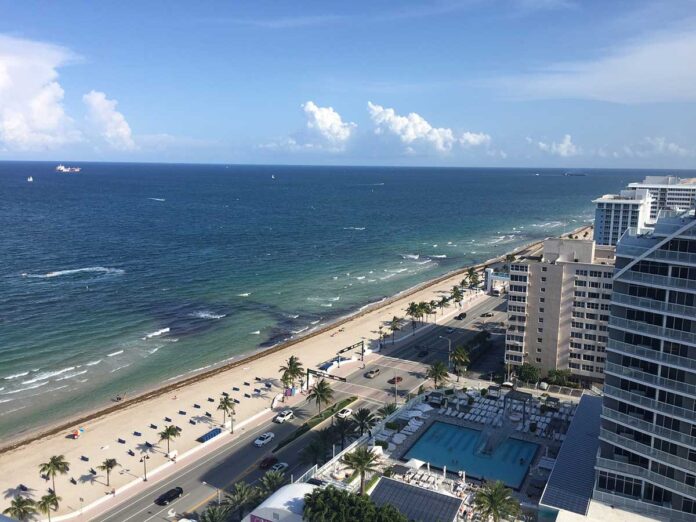Wherever I have lived or visited, I have always been lucky to find a vibrant, exciting and supportive LGBTQ+ community. They each offer their own sense of magic, their own sense of joie de vivre, and — rather amusingly — their own sense of rivalry with another nearby metropolis. Consider that a visiting New Yorker may tell you that the shopping is better in Manhattan, but a Philadelphian will remind them there is no sales tax on clothes in Pennsylvania.
Likewise, I had spent about six months living in Miami before taking a job with the South Florida Gay News based in Wilton Manors, just outside of Fort Lauderdale. The contrasts between those communities was perhaps the most striking of any LGBTQ communities I have encountered.
In Miami, walking down Lincoln Road, one encounters not only the accents of Spain, Mexico, Venezuela, and delightful Argentinian with its heavy dose of Italian but also the surprising sounds of Russian tourists and French expats. As the unofficial capital of the Caribbean there is a blend of music and art to fill the nights. I was very much on my own, but I never felt lonely there.
Miami, you see, is always ready for a party.
At a gallery opening one night, I made the unexpected acquaintance of a French woman. She drove me home and as she did invited me for dinner the next night. I didn’t expect this to come to fruition. However, as promised, at around eight o’clock the next night my phone rang. The woman — whose name is lost to memory — informed me she was waiting for me in front of my building.
I was living in Belle Meade at the time, just two blocks or so from the diner used in the gay film “Moonlight.” This neighborhood, along Biscayne Boulevard on what they call the East Side of Miami, was a little detached from reality. While the boulevard itself was tattered and a bit worn, houses and apartment buildings with strong gates hid unexpected pieces of paradise.
There were several artists at the dinner party, including a gay couple a decade older than me who kindly drove me home later. The soiree was held outdoors and although it was not necessary even in December, there was a fire going in an outdoor pit. There were multiple conversations going on in a few languages. But, even if I could only really converse in English, that didn’t matter as the house overlooked Biscayne Bay. Banana trees and palms listed back and forth in the cool breeze, and our glasses were never emptied of Spanish cava.
“You did what,” a college friend who also lived in Miami asked me the next day.
“I went to a dinner party with a French woman I met at some gallery downtown.”
“Met at some gallery? With someone you just met,” she asked again. “This is Miami! They could have fed you to the alligators in the canals!”
South Florida is a region of inconsistencies. There is the decidedly Spanish flavor, and European sophistication of Miami, but when one travels those 30 or so miles north to Fort Lauderdale all that vanishes. In the so-called “Island City” of Wilton Manors, which Miami detractors used to call “that town with the gay strip malls” there is still a very healthy population of Latinx people.
But, the vibe is different. It all feels very… American. Miami, it is not.
The so-called “gay strip malls” flank Wilton Drive. The town makes most of its money from the gay tourism that spills over from the beachfront city of Fort Lauderdale. But, instead of the European sophistication you find in Miami you are immediately aware of the two groups who overwhelm the local population. Namely, you encounter many a young lad one might identify as a “twink.” They come in droves to seek out the mature men who retire there, hoping at 21 to capture a retired sugar daddy.
At 30, I was too old to be one and too young to be the other. So, I settled into my life as a local editor. I embraced the town. In Wilton Manors, you paid at least one of your utilities at city hall. You could see the mayor at a happy hour. There, I couldn’t walk down the street without being offered a ride to the market because I was one of three people I knew in that town who didn’t own a car. Yet, somehow it was easy to find a sense of belonging.
Were there nights like that Miami dinner party with a French woman whose name is lost to me? No. But, had I never left Miami for Wilton Manors and Fort Lauderdale, I would not have ventured to live Out West for five years. Ultimately, I wouldn’t have grown homesick for my native Philadelphia, and returned after having met my fiance who sits next to me as I write this.
We have one more shot before we’re fully vaccinated against COVID-19. Once that happens, since so much has changed here in the decade I’ve been gone, there will be a whole new LGBTQ+ community for him to see and us to experience.
